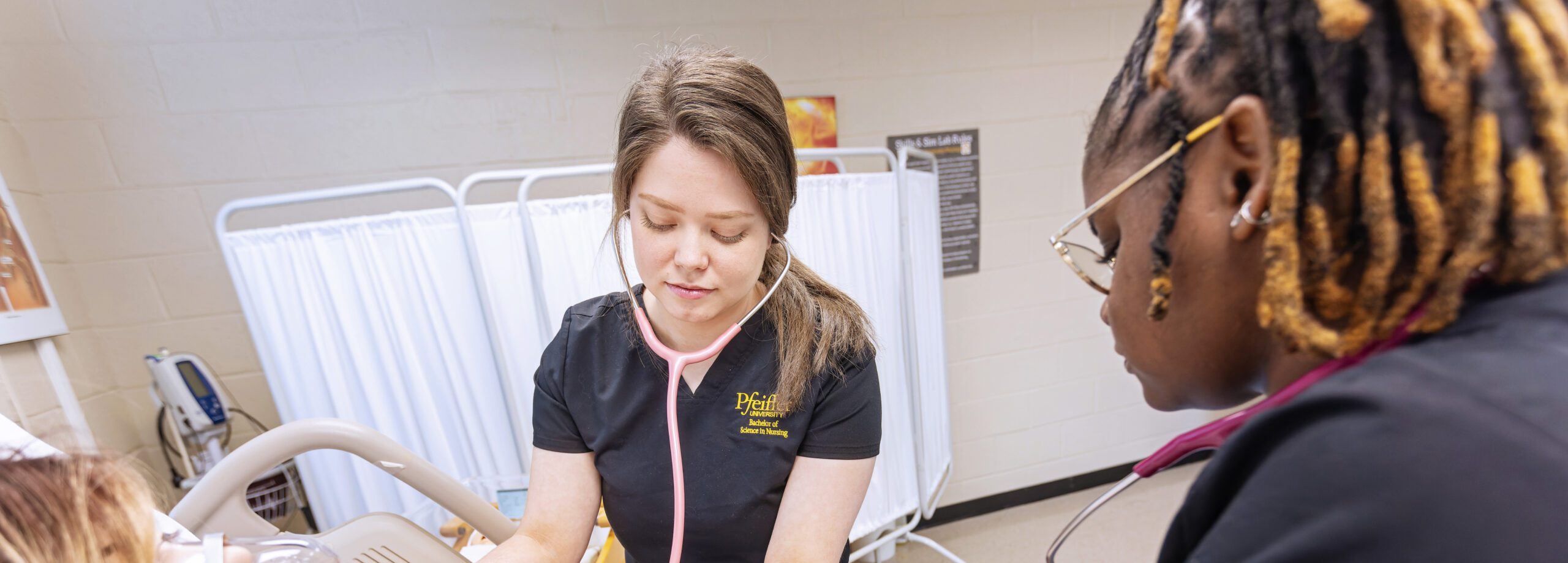Feb
06
Feb
08
Nursing Program Objectives
Familiarize yourself with our educational objectives. Get to know our philosophy. Meet our faculty. Prepare for excellence.
Learn more about Pfeiffer’s commitment to excellence in nursing.
Educational Objectives of Program
Upon completion of the Pfeiffer University baccalaureate program in nursing, you will have the ability to:
 | Integrate evidence-based knowledge for nursing practice from theories, sciences, and liberal arts education |
 | Apply caring principles and concepts with cultural humility into the holistic, person-centered care of diverse individuals, families, groups, and communities across the lifespan |
 | Provide comprehensive care to promote, restore, and maintain the maximum health potential of individuals, families, groups, and communities across the continuum while promoting health equity |
 | Promote transformational nursing through advancing nursing knowledge to foster positive health outcomes |
 | Demonstrate clinical judgment in autonomous decision-making and effective therapeutic communication to promote quality improvement and patient safety |
 | Facilitate therapeutic, caring, and interprofessional collaborative relationships with clients and members of interdisciplinary health teams |
 | Incorporate knowledge, patient education, and innovation to coordinate care in a complex healthcare system |
 | Integrate nursing informatics and emerging technologies with health policies in providing care to clients while improving health literacy |
 | Adhere to professional values, including ethical, moral, and legal standards of healthcare to promote advocacy, collaboration, and social justice |
 | Assume accountability and responsibility for personal and professional growth through leadership activities, continuous reflection, and lifelong learning |
- Integrate evidence-based knowledge from nursing, theories and concepts from liberal education, including the humanities and behavioral, mathematical, natural and physical sciences into the practice of professional nursing.
- Incorporate critical thinking skills in autonomous decision-making and effective therapeutic communication in the application of the nursing process with individuals, families, groups, and communities.
- Practice professional nursing competently in the roles of advocate, clinician, coordinator/collaborator, educator, leader, and consumer of research in a variety of health care settings to promote quality improvement and patient safety.
- Facilitate therapeutic, caring, and interprofessional collaborative relationships with clients and members of interdisciplinary health teams using written and emerging technology communication strategies.
- Integrate knowledge of leadership/management/administrative and information technology skills and health care policies in providing direct and indirect care to clients.
- Provide comprehensive, culturally competent client-centered care to promote, restore, and maintain the maximum health potential of individuals, families, groups and communities across the lifespan while promoting health care literacy.
- Assume accountability and responsibility for personal and professional growth through commitment to participation in servant leader activities, continuous self-evaluation, and lifelong learning.
- Incorporate professional values, professional standards, and ethical, moral, and legal aspects of health care into nursing practice to promote advocacy, collaboration, and social justice.
- Incorporate knowledge and transformational leadership skills related to system management into personal responsiveness to the health care needs of the Piedmont region, the state, the nation, and the global society.
- Integrate caring principles and concepts into the holistic nursing care of clients and families, groups, and communities across the lifespan.
Philosophy
Pfeiffer University’s nursing program functions within the framework of the purposes and values consistent with the mission and philosophy of the institution. A United Methodist-related university with multiple campuses and delivery systems, Pfeiffer University is committed to educational excellence, service and scholarship.
Within nurturing communities of learners, Pfeiffer values diversity and promotes the attainment of full academic and personal potential through accessible undergraduate and graduate programs. It is the vision of the university that our students embrace the Christian values of human dignity, integrity and service.
The educational philosophy of the department of nursing incorporates six Christian caring principles that include compassion, competence, confidence, conscience, commitment and comportment within nursing education and nursing practice (M. Simone Roach, RN, Ph.D., CSM). The faculty believes that education is a life-long process of reflection, intellectual challenge and practice.
Learning involves a change in attitudes, values and behavior brought about by critical thinking, knowledge and experiences. Learning is most likely to occur where learners are self-motivated, self-directed and active participants who accept responsibility for learning. It is best achieved in an educational environment that fosters creativity, encourages intellectual inquiry and recognizes each learner’s unique strengths and weaknesses.


